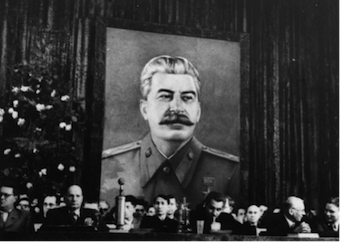

|
The Post-war Soviet Clampdown  Soviet Writers' Congress 1949 The Soviet leadership fought the Cold War by tightening its ideological grip and sealing off the country from Western influence. In his Bolshoi Theatre speech on 9 February 1946 Stalin made it clear that there would be no relaxation of the Soviet system. Censorship was tightened. The NVKD was strengthened and reorganized as two separate bureaucracies: the MVD was henceforth to control domestic security and the Gulag system; while the MGB (the forerunner of the KGB) was placed in charge of counter-intelligence and foreign intelligence. The post-war years saw no return to the terror levels of the 1930s. But every year several tens of thousands - many of them Jews and other nationalities accused of siding with the West - were arrested. The Gulag population rose by at least 1 million in the five years after 1945. Stalin launched a new purge of the army and the Party leadership. His first priority was to cut down the top army leaders, who enjoyed enormous popular authority as a result of the victory of 1945 and, in the case of Marshal Zhukov, had become the focus of the people's hopes for reform. On Stalin's orders, Zhukov was demoted to commander of the Odessa Military District. He was written out of Soviet accounts of the Great Patriotic War which portrayed Stalin as the sole architect of victory. Stalin also turned against the Party leadership of Leningrad, a city with a strong sense of independence and a vibrant literary culture rooted in the European values of the nineteenth century, which made it a stronghold of the intelligentsia's reform hopes. In 1949 several leading Party officials in Leningrad were arrested in what became known as the 'Leningrad Affair'. |
© 2014 Orlando Figes | All Rights Reserved